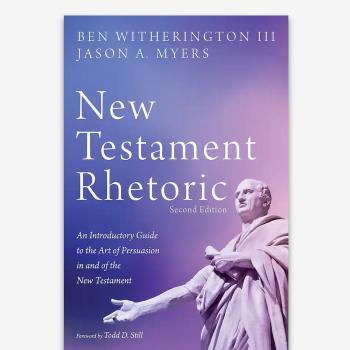———–
Douglas Campbell’s “Rereading” of Paul
by larry hurtado
In an earlier posting I drew attention to the review of recent Pauline scholarship by Tom Wright in the latest issue of Expository Times (vol. 123,May 2012), and mentioned that the same issue contains a large article by Douglas Campbell in which he sets out to summarize and underscore key emphases of his massive tome, The Deliverance of God: An Apocalyptic Rereading of Justification in Paul (Grand Rapids: Eerdmans, 2009). Campbell’s article: “An Apocalyptic Rereading of ‘Justification’ in Paul: Or, an Overview of the Argument of Douglas Campbell’s The Deliverance of God–by Douglas Campbell” (pp. 382-93). I promised a subsequent posting on Campbell’s article, and so the following brief set of comments.
Campbell’s book is truly massive (1200+ pages), and so his effort to summarize such a behemoth work in the ten pages of article is a commendably heroic task! Campbell claims that he offers in his book a revolutionary reading of Paul that, for the first time in the history of Christianity, grasps what Paul was really saying about salvation, “faith”, and several other related matters. And, to judge from some comments (e.g., the reviews of the book on Amazon.com), some readers clearly feel richly re-paid for the huge effort of working through it. I confess to being one of those who as yet hasn’t read the tome, so I can’t offer any personal judgement about how successful it is. I confine myself here to some observations about the Expository Times aticle.
Campbell alleges “deep, ongoing, and painful problems in the apostle’s interpretation” (385), the most troubling of which is what he describes as a widely-held representation of the Christian as “a contract-keeper, who grasps the contract of salvation by initiating an act (or acts) and fulfilling its stipulated condition(s)” (386). The particular object of Campbell’s scorn here is the traditional Protestant emphasis on personal faith as the necessary response to the Gospel. Critics will likely complain about Campbell’s characterization of “justification” theology as “contractual”. Some versions of it, perhaps. But any version of it?
He further posits that Romans 1–4 is the key text on which all “contractual” theology rests. “Only here do we find a text that seems to articulate explicitly an account of salvation in contractual and conditional terms…” (388). So, the major exegetical objective in Campbell’s tome is to present a radically different view of this part of Romans. Essentially, Campbell contends that most of this material is Paul engaging in a very clever rhetorical exercise in which he does a kind of “send-up” of the position he wishes to reject. So, e.g., all the references to in these chapters to the universal human predicament of sinful behaviour, the pronunciation of divine wrath against sin, and certainly all statements about divine reward or judgement, all these are the views of Jewish-Christian missionaries whom Campbell proposes were worries in Paul’s mind as he wrote to the Romans.
In Campbell’s view, Romans 1–4 are incompatible with Romans 5–8, properly understood, and the latter chapters are to be preferred as evidence of Paul’s view of salvation. He urges that Paul’s theology was all about divine initiative, divine gift, unconditional salvation, and these qualities appear to be what he designates an “apocalyptic” view.
Some enthusiastic readers proclaim Campbell’s book as potentially the most high-impact work on Paul since E.P. Sanders’ Paul and Palestinian Judaism (1977). It’s a bit early to judge, of course, especially as it will take patient readers some time to work through the huge tome (even those who feel impelled to do so immediately). I permit myself here simply posing a few questions, which I will have to take to my own reading of the book . . . in due course.
Are the emphases of Romans 1–4 incompatible with those of Romans 5–8? Is a belief in God’s gracious initiative and in salvation as totally divine gift incompatible with the idea that a human response is summoned (and enabled through the proclamation of the Gospel to which one is summoned to respond)?
Is any emphasis on a faith-response to the Gospel necessarily a “contractual” view? Has Campbell really done justice to the wide swathe of others whom he criticizes?
Is Campbell’s startling claim adequately supported that Romans 1–4 largely represents theological views that Paul rejects? Romans certainly reflects Paul’s use of certain argumentative and rhetorical devices, but more usually we can detect these in the phrasing (e.g., the use of questions which Paul then answers or corrects as unfounded in 3:1-9, 27-31).
In the end, I suspect that last this will be the crucial question, and Campbell will have to persuade exegetically. Too soon to tell as yet. But all of us who care about the question should probably feel obliged to give Campbell the favor of considering his effort to do so.

















